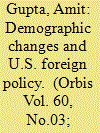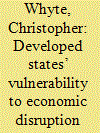| Srl | Item |
| 1 |
ID:
148084


|
|
|
|
|
| Summary/Abstract |
This article contends that states that employ cyber proxies are confronted with twin dilemmas. First, governments risk a Promethean dilemma when they equip cyber proxies with tools that could be turned against them. Second, governments risk a dilemma of inadvertent crisis escalation by empowering proxies with more expansive, or less restrained, political agendas that may exceed their mandates. The essay explores how states can manage the risks associated with these dilemmas and the conditions under which they are likely to backfire.
|
|
|
|
|
|
|
|
|
|
|
|
|
|
|
|
| 2 |
ID:
148081


|
|
|
|
|
| Summary/Abstract |
The demographic shift in America may well strengthen U.S. foreign policy, as well as military capability and economic competitiveness. In a globalized world, America's ethnic diversity, the innovation that comes from bringing the best and the brightest from around the world to this country, and the fact that a diverse population becomes a stakeholder class could all work to ensure that the United States remains the most influential nation in the world.
|
|
|
|
|
|
|
|
|
|
|
|
|
|
|
|
| 3 |
ID:
148085


|
|
|
|
|
| Summary/Abstract |
Much of the literature on cyberspace and national security has backed away from the idea that cyberwar presents an imminent threat in world politics. However, there remains great concern about the potential for broad-scoped economic disruption prosecuted through digital means. How vulnerable are developed states to cyber economic warfare? Could either a concentrated cyber economic warfare initiative or a scalable disruption effect prove crippling on a large scale? And, most importantly, what are the implications for state policy and international interactions? This article contends that large, advanced industrial states are only superficially more vulnerable to disruption than are other types of systems.
|
|
|
|
|
|
|
|
|
|
|
|
|
|
|
|
| 4 |
ID:
148083


|
|
|
|
|
| Summary/Abstract |
China's rise is a bargaining process between China and the outside world—especially with the United States. This article suggests two strategies, “socialization” and “legitimation,” which a rising power can use to seek “accommodation for identity” with the hegemon. Using China's peaceful rise after the Cold War as a case study, the essay then examines how China employed these two strategies to reach bargaining deals on the arms control regimes and anti-separatist movements in Xinjiang with the outside world. It concludes that the United States needs to take China's bargaining efforts seriously and consider possible peaceful accommodation with China.
|
|
|
|
|
|
|
|
|
|
|
|
|
|
|
|
| 5 |
ID:
148082


|
|
|
|
|
| Summary/Abstract |
The consequences and implications of China's rise have been analyzed and discussed from a number of perspectives. There has been little analysis that specifically evaluates the implications for the Atlantic Alliance, however, and whether an international system defined by U.S.-China bi-polarity would lead to a strengthening or a weakening of the transatlantic relationship. This article argues that China's rise will create security dynamics that likely will lead to a weakening of the Atlantic Alliance. It is unlikely that China's rise will provide NATO with a renewed purpose or give a convincing rationale for alliance cohesion the way the Soviet Union once did. Instead, China's rise will reveal divergent strategic interests and priorities among the members of the Atlantic Alliance, with a real possibility that America's rebalancing toward the Asia-Pacific could intensify perceptions on both sides of the Atlantic of NATO's declining geopolitical value and relevance.
|
|
|
|
|
|
|
|
|
|
|
|
|
|
|
|
| 6 |
ID:
148080


|
|
|
|
|
| Summary/Abstract |
The next President inevitably will face difficult tradeoffs in U.S. foreign policy. Trying to split the difference between opposing policy positions can present serious risks. The presentation of real choices to the chief executive is central to his or her authority. A President should be made aware of the options. Then it is up to him or her to decide. The author contends that strategic planning can help, and concludes with six specific recommendations for NSC reform.
|
|
|
|
|
|
|
|
|
|
|
|
|
|
|
|
| 7 |
ID:
148086


|
|
|
|
|
| Summary/Abstract |
This article wrestles with the question: could there have been something in the Woodrow Wilson presidency that remains germane to the continuing debate about whether the United States and its Western allies “lost” Russia following the ending of the Cold War and disappearance of the Soviet Union?
|
|
|
|
|
|
|
|
|
|
|
|
|
|
|
|